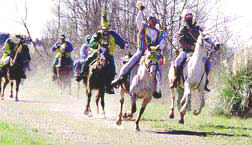Mardi Gras, the American version of Carnival has been celebrated in South Louisiana, U.S.A., since around 1755. Mardi Gras literally means “Fat Tuesday” in French.
Many people are familiar with the giant Mardi Gras Parade and the other festivities in New Orleans. Much less known are the celebrations in the smaller towns which include: Le Courir de Mardi Gras or The Mardi Gras Run.
The Mardi Gras Run is traditionally done by men only, but in some places women have started their own.
During The Mardi Gras Run, everyone wears costumes and masks, except for Le Capitaine (the Captain), and his assistants. Le Capitaine wears a cowboy hat and a festive cape. All of the participants go from house to house begging for ingredients for a huge gumbo, which the whole community will eat at nighttime.
Gumbo is a traditional dish from Louisiana. It’s a thick soup, made with a variety of meats, spices, and vegetables, often including okra, which is used to thicken the soup. It’s served over rice.
Le Capitaine is in charge of the whole procession. He makes sure all the participants stay under some sort of control, as they’re likely to be drinking during The Mardi Gras Run. Le Capitiane usually rides on a horse. The participants are often on horseback too. Sometimes the procession is followed by several flatbed trucks filled with costumed women and children who watch the proceedings.
When the procession reaches a farm, le Capitaine, holding a white flag, will approach the farmer and ask if the riders can enter his property. Once given permission the men will often “beg” the farmer for a chicken. They will often chant “Ayoù la poule, ayoù la poule, ayoù la poule?” In English that’s, “Where’s the chicken? Where’s the chicken? Where’s the chicken?” If the farmer has a chicken to give, he will often throw it up in the air and the men will have to catch it. Or the farmer might give rice or some other ingredient for the gumbo. That is followed by singing and dancing. Then the procession will move on to the next house.
At the end of the Mardi Gras Run all the ingredients are given to the cooks to make a big gumbo. At night the gumbo is eaten and there’s a fais do-do, which is a big dance. Fais do-do means “go to sleep” in French. Fais do-do, in Cajun French, specifically comes from putting the children to sleep in one area at the dance, so the adults can go and party!
There are different versions of La Chanson de Mardi Gras or The Mardi Gras Song that are sung during The Mardi Gras Run. The song differs from town to town. The verse that is most common is…
La Chanson de Mardi Gras
(French)Capitaine, Capitaine, voyage ton flag.
Allons se mettre dessus le chemin.
Capitaine, Capitaine, voyage ton flag.
Allons aller chez l’autre voisin.The Mardi Gras Song
(English)Captain, Captain, wave your flag.
Let’s take to the road.
Captain, Captain, show your flag.
Let’s go to another neighbor.
Below is the basic way some of the more common verses go…
In French…
Les Mardi Gras devient de tout partout.
Oui, mon cher comarade. Mais tout l’autour de moyeu.
Les Mardi Gras vient de tout partout, mais,
Tout l’autour de moyeu.Voulez vous recevoir cette bande des Mardi Gras.
Mais voulez vous recevoir cette bande des grand soulards.
Les Mardi Gras demander la rentre au maitre de la maison,
Avec toutes les politesses.English translation…
The Mardis Gras comes from everywhere.
Yes, my dear comrade, but all around the hub
The Mardis Gras comes from everywhere,
But all around the hub.Do you want to receive this band of Mardi Gras (beggers)?
But do you want to receive this band of big drunks?
The Mardi Gras asks the master of the house to enter,
With all courtesy.
One expression you’ll hear at Mardi Gras is Laissez les bon temps rouler!
So… Let the good times roll!
Lisa
This article was posted on Thursday, February 23rd, 2006 at 11:32 pm and is filed under Cajun, Countries & Cultures, French, Holiday Songs, Holidays Around the World, La Chanson de Mardi Gras - The Mardi Gras Song, Languages, Mardi Gras, Mardi Gras Songs, USA. You can follow any responses to this entry through the RSS 2.0 feed. You can skip to the end and leave a response. Pinging is currently not allowed.
7 Responses to “The Mardi Gras Run – Let the good times roll!”
Leave a Reply


























January 28th, 2007 at 9:38 am
Awesome! Your website has helped me teach my students about the “true” Mardi Gras.
Thank-you
Kyla
January 9th, 2008 at 2:40 am
Hi. I’m from the rural town of Church Point, Louisiana. I enjoyed your article on our Courir de Mardi Gras. Passe une bonne Mardi Gras mon ami!
January 30th, 2008 at 3:47 pm
Reminds me of home. This site brings Slaughter, Baton Rouge and New Orleans where I worked, Tulane University Hospital, all the way up here in Alaska
Passe une bonne Mardi Gras mon ami!
January 30th, 2008 at 8:18 pm
Merci! Vous aussi!
February 25th, 2009 at 4:27 pm
[…] I wrote about the tradition of The Mardi Gras Run in Southern Louisiana, USA. Each town has it’s own version of The Mardi Gras Song or La […]
April 1st, 2014 at 11:26 am
Hi Lisa, this Acadian just came back to Canada from Louisiane. You wrote on this page: «One expression you’ll hear at Mardi Gras is Laissez les bon temps roule!» It should read : Laissez les bons temps rouler! Note the plural of bon and the r for the verb rouler. I have seen this mistake many times on T-shirts. Just wanted to let you know cousine.
April 1st, 2014 at 11:52 am
Merci Mario! I made the correction.